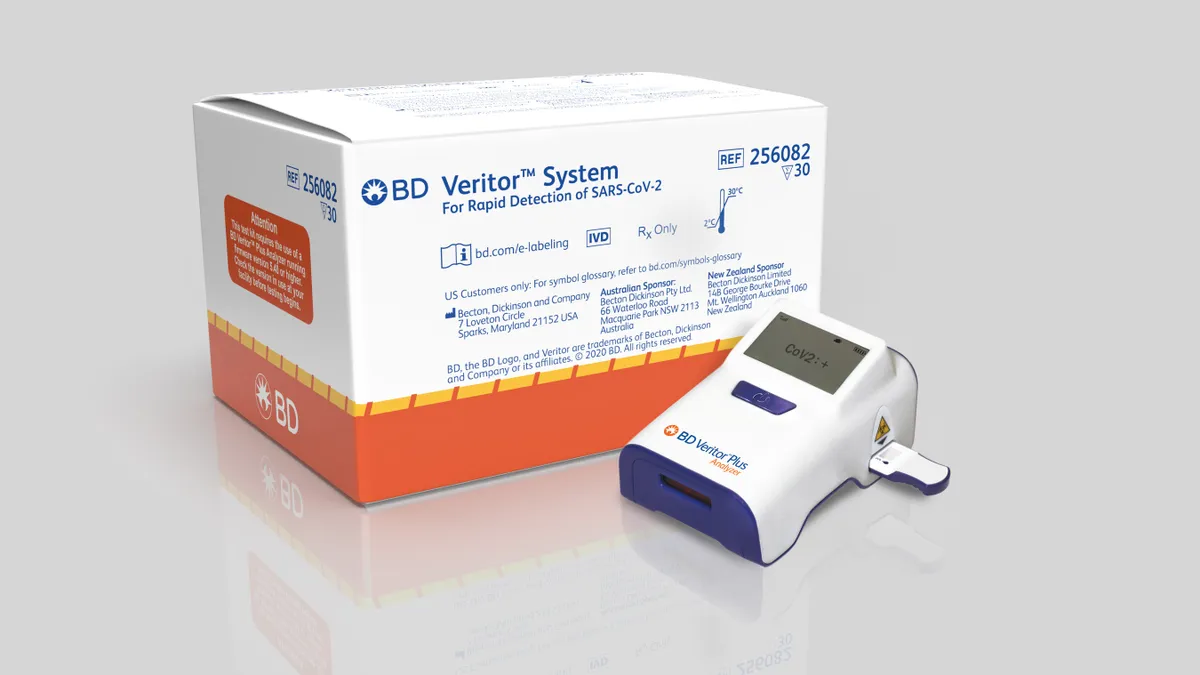Dive Brief:
- Becton Dickinson grew revenue in their fiscal first quarter by 25.8% compared to 2019, pulling in a total of approximately $5.3 billion. The medtech started its fiscal year 2021 beating expectations for its overall business and across multiple segments, led by a nearly $300 million beat for COVID-19 testing. Final numbers are in line with results preannounced in January.
- CEO Tom Polen said during a Thursday earnings call COVID-19 testing success was fueled by the Veritor rapid antigen test, which had revenues higher than the company expected. Polen said there are now more than 70,000 Veritor analyzers globally.
- J.P. Morgan analysts wrote that BD beat Wall Street's expectations for overall sales by about $640 million, COVID-19 testing revenue by $298 million, and medical sales by about $201 million.
Dive Insight
COVID-19 testing has been a bright spot for the company over the last two quarters, with both the BD Max testing system and the Veritor test as part of its portfolio. Sales totaled about $440 million in the company's fiscal fourth quarter of last year and then nearly doubled in the first quarter of 2021.
BD's life sciences business brought in approximately $1.9 billion in the quarter, beating expectations by $342 million, according to J.P. Morgan. The segment was made up largely by the $867 million in COVID-19 revenues, with $688 million coming from Veritor.
Polen said a dip in revenues for the product should be expected in the second quarter and the second half as the company is lowering the price of the test. The CEO said that the decision was to reach a wider number of patients and has been part of the company's plan as manufacturing capacity ramped up. Still, expectations are for revenues to drop even as the company is targeting higher volumes with a lower price.
After bringing in $688 million in the first quarter, Polen expects 2021 Veritor revenues in a range of $1 billion to $1.5 billion.
Overall, BD anticipates the company hitting a revenue growth range of 12-14% on a reported basis in the quarter, up from the company's previous range of high single digits to low double digits.
Multiple analysts wrote that while uncertainty remains around the pandemic, the guidance felt conservative given the quarter's results.
"The guidance raise was less than the size of the beat, but given we are only one quarter into the year, COVID is still an uncertainty, and the trajectory of COVID testing is still debatable, we believe the new range is highly prudent and sets the stage for further beats and raises as we progress through the year," J.P. Morgan analysts wrote.
Polen cited risks of a further electives slowdown and numerous virus variants contributing to the company's caution.
"There remains uncertainty around the effectiveness and timing of the vaccines, especially with additional variants that are out there. But we can't predict what's going to happen there in the second half of the year," Polen said. "We remain projecting that [there will] be very strong demand for antigen testing in the first half of the year, and that the second half of the year is less certain."
The CEO did say that testing demand should remain throughout the year and possibly even into 2022; although, he was unsure at what levels.
As new variants of the virus are discovered and become more prominent, questions remain whether current COVID-19 tests can accurately identify them.
Dave Hickey, executive vice president and president of BD's life sciences division, said after the company ran computer models testing new variants on the BD Max system, there was no impact on the test, and there was no impact on Veritor after an analysis was done for the Brazil, South Africa and U.K. variants.
The company is continuing to monitor the tests' performances with variants that are known and any others that may come about, according to Hickey.












